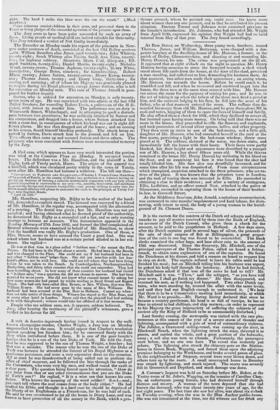A libel case, which appears to have very much interested
the parties, was tried at the Common Pleas on Monday. It occupied twelve hours. The defendant was a Mr. Hamilton, and the plaintiff a Mr. Rigby, both of Yately parish, Hants. The origin of the quarrel was a handbill, which was circulated pretty widely in the town of Yately, soon after Mr. Hamilton had become a widower. The bill ran thus—.
et IlvipaRTANT TO PARENTS AND GUARDIANS.—Whereas I, FraneisJames Hamilton, ofthe parish of Yately. in the county of Hants (my probation as a widower having expired), am desirous of forming a suitable matrimonial connexion uith any lady whose general disposition is answerable to my own—viz., amiable, benevolent, and assiduous Sc preserving foreign and domestic tranquillity—any person wishing to enter into the above-named alliance will please to announce the same to the principal, at 'Irately Cottage, near Bagshot, Hants.
" April 13, 1831."
Mr. Hamilton, suspecting Mr. Riiby to be the author of the handbill, demanded an explicit denial. The demand was conveyed by a friend of Mr. Hamilton, in the regular way, accompanied with the alternative of a meeting. The denial was given ; but Mr. Hamilton was not yet satisfied ; and having obtained what he deemed proof of the authorship, he denounced Mr. Rigby as a scoundrel and a liar, and as only wanting courage to become an assassin. This denunciation appeared in the Reading Mercury of 27th June 1831, and formed the libel complained of. Several witnesses were examined in behalf of Mr. Hamilton, to show that the handbill was really Mr. Rigby's production. One of these, a Mrs. Bruere, seems to have amused the Court a good deal. She was asked where her husband was at a certain period alluded to in her evidence. She replied— He was at that time in a place called "Seldom seen :" she meant the Fleet Prison. He had been in the Fleet about a month. He had been in the Bench, and was changed to the Fleet. She could not say if her husband had been in any other "Seldom seen" before then. She did not interfere with her husband's affairs, nor he with hers. She could not tell where they had been living before he was taken to the Bench. In Cambridgeshire, Northamptonshire, Derbyshire, and thirty other counties that she could not remember. They had been travelling about. In how many of these counties her husband had visited a "Seldom seen," was a question she did not choose to answer. She had been married for seven years. She did not know what counsel meant by asking her how many names she had passed by whilst residing in Bond Street and Regent Street. She had only been called Mrs. Bruere, or Mrs. William, that was Mrs. William Bruere. She had never gone by the name of Mrs. Williams. Her husband had been arrested at the Blue Boar in Holborn. Cannot say when : does not take notice of those things. Witness has stayed at the Blue Boar, and at every other hotel in London. Never said that the plaintiff had had nothing to do with this placard ; witness would take her affidavit of it that moment.
People who are seldom seen, are, it appears, seldom believed. The Jury, after hearing the testimony of the plaintiff's witnesses, gave a verdict in his favour for 50/.


























 Previous page
Previous page